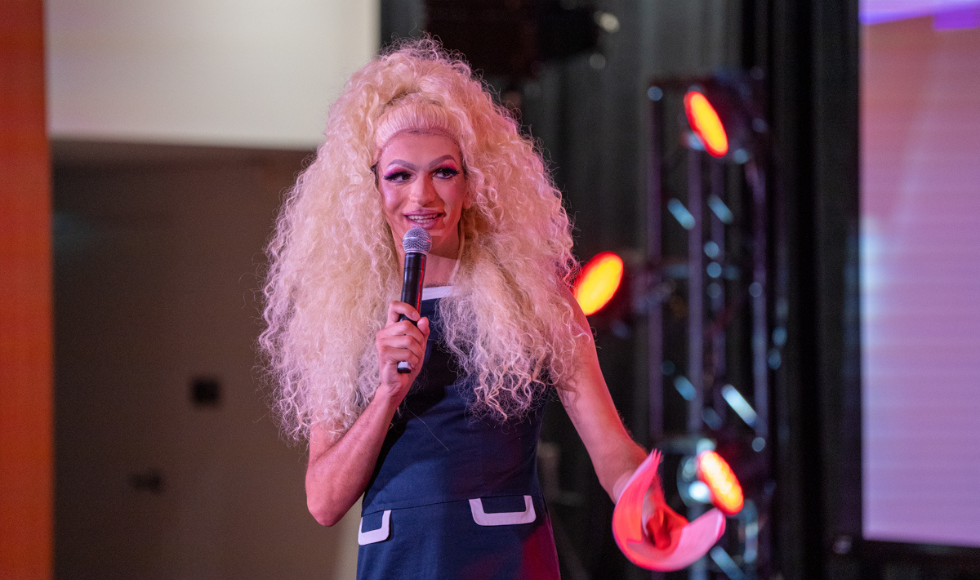SVPRO partners with students to build a culture of consent on campus

Unita Assk, McMaster SVPRO's consent-educating drag queen, who hosted the kickoff to Welcome Week, is a strong asset for not only consent education but also for raising the office's profile — in a flamboyant yet judgment-free way. (Photo by Georgia Kirkos, McMaster University)
Content warning: Contains reference to sexual violence.
Last week, a drag queen named Unita Assk took the stage at the kickoff to McMaster’s Welcome Week.
Her message, delivered directly to 4,000 first-year students, was simple and important: “If you’re not sure you have consent, Unita Assk.”
Unita, a persona created by Wil Prakash Fujarczuk, a full-time sexual violence prevention educator at McMaster, is one part of a growing list of initiatives from the Sexual Violence Prevention and Response Office (SVPRO) as it expands and finds new ways to connect with students during the start of the semester and through the school year.
Other initiatives include high-visibility signs across campus explaining what consent is and why it matters, a robust peer educator program, bystander intervention initiatives and a slate of year-round programming.
SVPRO’s aim is to train every student leader and many others in the campus community to prevent harm and to respond effectively to disclosures of sexual violence. They also want to make sure students, staff and faculty are aware of the support and resources the Office offers.
Here’s an overview of SVPRO’s outreach efforts this fall:
Bystander intervention
Training student leaders and peers in bystander intervention is crucial, especially at the start of the school year, when there’s often a heightened awareness of sexual violence on campuses, says Lenore Lukasik-Foss, director of SVPRO and Anti-Oppression Programs. “Before sexual violence happens, our hope is that these folks, who are on-the-ground peers, are equipped to be active and feel comfortable disrupting harm,” she says.
Disclosures and response
Upper-year student leaders can often be the ones receiving initial disclosures of sexual violence, and it’s important to equip them to handle those situations, says Fujarczuk, Sexual Violence Prevention Education Manager at the SVPRO.
He has run multiple training sessions for more than 1,800 student leaders and student-facing staff involved in this year’s Welcome Week and beyond — including faculty reps, community advisors, student union reps and others — on bystander intervention, building a culture of consent and responding to disclosures of harm.
“We know students are more likely to disclose to their peers,” Lukasik-Foss says, which is why the student-leader training has been intensive, and sometimes includes role-play to illustrate effective responses to students.
Consent and Unita Assk
Unita Assk is a strong champion for not only consent education but also for raising SVPRO’S profile — in a flamboyant yet judgment-free way.
“We want to make sure people feel as comfortable as they can coming to us for support,” Unita (aka Fujarczuk) says.
Her presence also signals to queer members of the campus community that they can feel safe here, she adds. “I think back to first-year me, if I had seen a drag queen at the university who works here, how meaningful that would’ve been.”
Unita’s sense of fun is also a reminder of the need for open and honest communication about healthy relationships. “Of course, sexual violence is serious matter,” she says, “but there is also room for joy and celebration in talking about relationships, and Unita encourages that conversational tone.”
Support, community partnerships and resources
Lukasik-Foss, Fujarczuk and response case manager Natalie Lafleur are determined to raise awareness of sexual violence supports, services and reporting procedures across campus.
“A lot of students just don’t know that offices like ours exist on their campuses, and that’s a real shame,” Fujarczuk says. “So, we want to just let students know: Hey, we’re here, we care, we will work with you and we will help you.”
“She’ll help them look at available resources and supports — maybe they need a delay in turning in a paper or other academic accommodations,” Lukasik-Foss says.
Whatever they are navigating, including medical or cultural concerns, “they can come and talk to Natalie and she will help them.”
The SVPRO, which supports faculty and staff as well as students, is also working on developing a formalized partnership with SACHA, the Sexual Assault Centre (Hamilton and Area) to enhance prevention education on campus.
What’s next
In addition to being a prominent presence during Welcome Week, SVPRO programming continues throughout the school year.
Fujarczuk created a campaign called Blueprints for Change, a webinar series on healthy masculinity.
He also trains peer educators, who then run programs on consent and sexual violence prevention all through the school year.
“We know that peer influence is really strong and that the peers are in spaces where we physically are not part of,” Fujarczuk notes.
“They’re able to disrupt harm in spaces where we cannot.”

